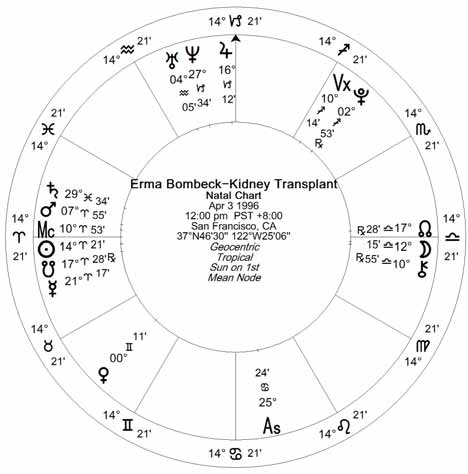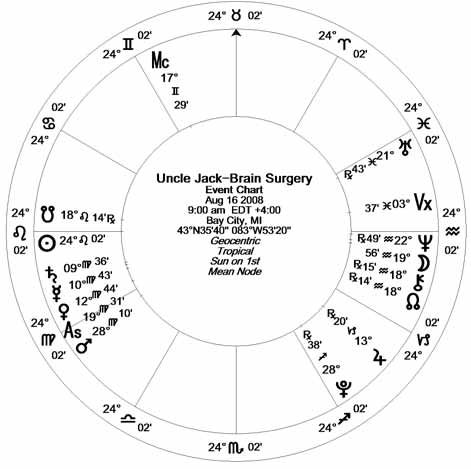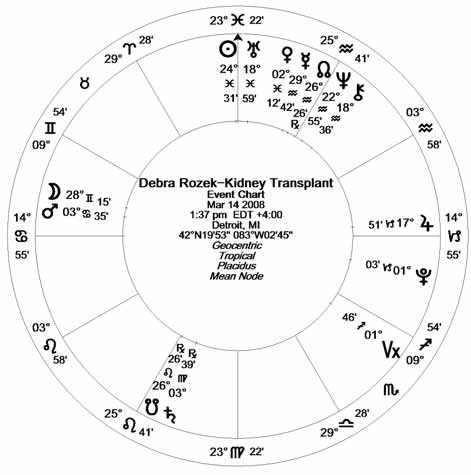Articles
Other Articles: Medical Astrology: Surgical Elections Astrology and Experimental Psychology The Valentines That Never Came Secondary Progressed Lunar Return The Miracle of the Sun (PDF File) Farewell, Dr. Chronos (Tom Goyett)Medical Astrology: Surgical Elections
By Debra K. Rozek, M.A., M.P.H.
I was honored to be a lunchtime lecturer at ISAR's 2009 conference in Chicago. Since I spoke there on Medical Astrology: Surgical Elections, I've presented the information in three more states, and received correspondence from medical astrologers and patients from all over the world. Based on my experience and research, the application of simple electional rules has the potential to improve outcomes and save lives for patients facing surgeries and other health care procedures.
Electional astrology is an ancient technique that involves choosing the best time for a desired outcome. It is essentially the opposite of horary astrology which is used to answer a question, based upon the time when the question is asked.
In medical astrology, the time that the patient first becomes ill and takes to the sick bed is called the decumbiture chart. Jane Ridder-Patrick said that the decumbiture chart can tell the nature of the problem, the cause, the prognosis, and suggested treatments.
Charts derived using these classical techniques can all be read as stand-alones. There is additional information to be gleaned by comparing them to the subject’s natal chart, but those considerations are secondary.
The same basic rules can also be used to elect an aspicious time for other health care procedures or event such as physician office visits or the purchase of durable medical equipment. Electional astrology has unlimited applications and can also be used, for example, to choose a good time to get married, file a lawsuit, open a business, or go on vacation. Essentially, the electional chart represents the birth chart for the event.
I began by studying the rules for elections in general and surgical elections in particular, from Vivian Robson,Eileen Naumann, Marcia Starck, and others. With some variations amongst the authors, the common denominator appeared to be the lunar phase, her aspects, and the sign she occupied at the time of the surgery, in descending order of importance.
Vivian Robson devoted an entire chapter to the role of the moon in “Electional Astrology.” In his words, the moon is of “paramount importance in the study of elections”…because “the moon is a general significator of everything relating to human affairs.” March and McEvers consider the moon to warrant primary consideration in electional charts because “it is the fastest moving of the ten planets and is often used as a timer”. Additionally, the moon is always co-ruler of the ascendant, or the querent.
First, it is desirable to have the moon in her waxing phase, increasing in light, between the new and the full.It is best not to begin a surgery until at least 12 degrees or 24 hours after the new moon, and to have it completed at least 12 degrees or 24 hours before the full moon. Without question, eclipses are to be avoided. Ivy Goldstein-Jacobson adds that the moon should be above the horizon for a good election.
The second consideration involves lunar aspects, but only applying classical or Ptolemaic ones: conjunctions, sextiles, squares, trines, and oppositions. My classical astrology teacher, Win Rowe of Lansing, Michigan, told me the last aspect made by the moon during the surgery was the most important one. Personally, when it’s my own flesh, I want all good aspects during the surgery or procedure. Vivian Robson does not want to see ANY aspects, good or bad, made by the moon to malefics during the surgery.
Vivien Robson also believes that ANY lunar aspect made to a retrograde planet during surgery signifies “failure, trouble, and difficulty.” Eileen Naumann wrote that retrograde mercury could indicat“misunderstandings, mistakes and confusion.” She further states that when mars retrogrades, surgeons “tend not to be at their steadiest or most reliable: they may not be able to concentrate well.” She further correlates retrograde mars to potential heavy blood loss.
Win Rowe told me that a void-of-course moon has “nowhere to go.” Since that sounds like “DOA (dead on arrival),” I would avoid surgery when the moon is void. Eileen Naumann says that a VOC moon day is not good for surgery as “there could be a cancellation, complications, or a need to reoperate.”
The third lunar consideration is the moon’s sign at the time of the surgery. The ancients believed it was important to have the moon in a sign that does NOT rule the part of the body being operated upon. Vivien Robson agrees with this adding that, in general, the moon is best in fixed signs for surgeries.
Finally, the ancients avoided surgeries while the moon transited the “via combusta,” between 15 Libra and 15 Scorpio. John Frawley believes that the moon does not like being in those degrees, where she is “distressed.” He considers her passage there to show a “period of unpleasant emotional turbulence.”
Practical considerations when facing a surgery are:
- In urgent situations warranting immediate medical attention and/or emergency surgery, common sense dictates your best option is to act quickly when moments could mean the difference between life and death.
- Increasingly, hospitals and outpatient surgical centers are components of large health care corporation bureaucracies. You may not be given an opportunity to choose the date or time of your surgery.
- In cases where you are able to exercise choice, it is in your best interest to apply these rules for surgical elections. Astrological calendars conveniently enable you to quickly see the lunar phase, aspects and sign position and changes each day. In some cases, you are able to choose the date for a major surgery, as I did for my kidney transplant. For an outpatient surgery, you may have an opportunity to choose the date as well as morning or afternoon. It is unlikely, however, that you will be able to choose the time of the procedure, or the ascendant.
- You will never get a perfect electional chart, so do the best you can within your given parameters and timeframe. Following are three examples of dates for major surgeries, along with their outcomes. Even though I do not have the times for the first two surgeries, you ill clearly see from solar charts how the rules applied in each situation for better or for worse.
CASE #1 – Erma Bombeck – Kidney Transplant
Erma Bombeck was born in Dayton, Ohio on February 21, 1927 at 4:40 a.m. CST. She was the infamous “goddess of the ironing board,” author, columnist and satirist who wrote of the trials and tribulations of the typical Midwestern surburban housewife.
Erma Bombeck sufferred kidney failure due to polycystic kidney disease inherited from her father. She went on continuous ambulatory peritoneal dialysis three years before receiving a kidney transplant. Erma Bombeck’s kidney transplant was performed at the San Francisco UC Medical Center on April 3, 1996. For the surgery, I present a solar chart for 12:00 p.m. PST, with the sun on the 1st. Chart is located on the next page.

First of all, this operation was performed within 24 hours of a full moon lunar eclipse. Lunar aspects for that date involved an opposition to Mars, a conjunction to retrograde Chiron (which rules the kidneys, according to French medical astrologer Guy de Penguern), an opposition to the sun, a square to Jupiter, and a conjunction to the nodes. Also, the moon was in the sign of Libra, which rules the kidneys. If the operation began after 6:00 p.m., the moon was also transiting the via combusta. According to our rules for surgical elections, none of these considerations were favorable.
Erma Bombeck made her transition on April 22, 1996 at 3:27 a.m., PDT in San Francisco. The cause of death was uremia, a form of self-poisoning, resulting from complications following the transplant operation.
CASE #2 – Uncle Jack
Uncle Jack was born in Bay City, Michigan on February 13, 1926. He was a sailor in WWII, and my Dad’s youngest brother. Uncle Jack had been doctoring for cancer for over 10 years. Weakened and damaged from the chemotherapy, he developed painful neuropathy in both legs which left him with an unsteady gate. Approximately one week after a new moon solar eclipse on his natal Jupiter, he fell in his garage. Aunt JoAnne came home to find him with a gash above his eyebrow, amidst a pool of blood. She rushed him to the emergency room where he was admitted.
Doctors found internal bleeding on the brain which may have preceded the fall, and performed the first surgery to relieve swelling of his brain. Shortly thereafter, he acquired the dreaded MRSA infection, and a second emergency brain surgery was scheduled. That surgery was performed on the morning of August 16, 2008, exact time unknown. Since I knew it was in the morning, I present a solar chart for 9:00 a.m. on that date.
Using our three rules for surgical elections, we see that the second emergency brain surgery was performed on the day of the full moon lunar eclipse. Depending upon the exact time of the surgery, possible lunar aspects that morning include conjunctions to retrograde Chiron and the moon’s nodes, followed by a sextile to Uranus, then a conjunction to retrograde Neptune. If the surgery began after 6:30 a.m. and ended made by the moon during the surgery.

The moon was in Aquarius. H. S. Cornell considers Mercury “the strong ruler of the brain.” I contend that Uranus, the “higher octave” of mercury, is co-ruler of the brain. My rationale is that central nervous system communication in the brain is electrical as well as chemical, and Uranus rules electricity. Therefore, I consider moon in Aquarius to be in the sign ruling the part of the body being operated upon. Of course, Uranus had not yet been discovered so it was not used by the ancients.
Uncle Jack expired two weeks later, on August 31, at 1:30 p.m. in our hometown, Bay City, Michigan. I don’t know the cause of death listed on his death certificate. His daughter-in-law, a BSN and clinical nursing supervisor, believes that Uncle Jack died from the MRSA infection. I suspect it was MRSA, coupled with the drugs used to combat the MRSA, sedate him for two back-to-back brain surgeries, and pain control and his already weakened condition. Infections and drugs are both ruled by Neptune, and the eclipsed full moon was applying to conjunct retrograde Neptune, both opposing the sun, on the date of that second operation.
CASE #3 – Debra Rozek – Kidney Transplant
I was born in Bay City, Michigan on June 13, 1953 at 10:02 p.m. EST. I went into renal failure over a 27-year period with a complicated medical history originating from a birth defect. Like Erma Bombeck, I was kept alive on continuous ambulatory peritoneal dialysis that began on May 27, 2007. I had the extreme good fortune of a matching living donor who volunteered immediately. It took six months of extensive testing on both of us before we were cleared for the transplant surgery.
I wanted to schedule the surgery as soon as possible, but I knew the importance of picking a good date astrologically. The hospital only performed living transplants on Wednesdays and Fridays. I found two good dates in January, but they were already taken. The month of February had 2 eclipses and mercury was retrograde, so February was out. There was only 1 good date in March that met the three criteria for favorable lunar phase, aspects and sign, and that was March 14, the date on which I received my transplant.

When my transplant operation began, the moon was in her waxing phase, increasing in light, above the horizon. The only aspect she made during the surgery was a trine to mercury. Both planets were on critical last degrees making the aspect, but I didn’t care. I considered it a minor consideration, and my life was about to dramatically change for the better. The moon was in Gemini when the operation began, which did not rule the kidney (the organ to be transplanted) nor the stomach (where the kidney was to be placed). All three major considerations for surgical elections had been favorably met
When this article is published, the transplanted kidney will have been working for 3 years, the definition of a successful kidney transplant by the medical community. Beyond that, I beat the odds in several ways. I did not gain weight from the steroids, I did not develop diabetes, I have had no major infections nor have I been rehospitalized since the operation. For all of these reasons, I believe that using the rules for surgical elections had a positive effect.
I dedicate this article to my brave and generous donor, Joan Anderson, and to Ronald Lee Herrick, both humble unsung heroes. Mr. Herrick donated a kidney to his dying twin brother on December 23, 1954 in Boston. He quietly made world history by being the donor of the first known successful human organ transplant.
Ronald Lee Herrick died on December 27, 2010, and there was only a small article released by the Associated Press. On the day he died, transiting Sun was conjunct transiting Pluto, both conjunct transiting north node on the date he donated that kidney. My interpretation is that he fulfilled his destiny. Those twins are now together forever, and may they rest in peace.
Biography:
Debra Rozek is a Professional Astrologer and Experimental Psychologist from Big Rapids, Michigan. Having studied and practiced astrology since the early 1970s, she now writes, lectures, and teaches nationally. Her special interests include medical and classical astrology, alternative healing modalities, nutrition and metaphysics. Debra can be reached at debrakrozek@hotmail.com.
Bibliography:
Bombeck, Erma
Biography. Astro-databank. Retrieved on January 11, 2011 from https://www.astro.com/astro-databank/Bombeck,_Erma.
Cornell, H.L.
Encyclopedia of Medical Astrology. Llewellyn Publishers, St. Paul, MN and Samuel Weiser, Inc. New York, NY, 1972.
De Penguern, Guy
Medaps and Genaps Workbook. Institute for Teaching and Research in Astro-Psycho-Physics. Richard Nelson, Miami, FL, 2005.
Frawley, John
The Horary Textbook. Apprentice Books, London, ENGLAND, 2005.
Goldstein-Jacobson, Ivy M.
Simplified Horary Astrology. Frank Severy Publishing, Alhambra, CA 1960.
Marsh, Marion D. and McEvers, Joan
The Only Way to Learn About Horary and Electional Astrology. Volume 6, Second Edition, ACS Publications, San Diego, CA, 1994.
Naumann, Eileen
Medical Astrology. Blue Turtle Publishing, Cottonwood, AZ, 1995.
Ridder-Patrick, Jane
A Handbook of Medical Astrology. The Penguin Group, London, ENGLAND, 2005.
Robson, Vivien E.
Electional Astrology. Samuel Weiser, Inc. New York, NY, 1972.
Starck, Marcia
Medical Astrology: Healing for the 21st Century. Earth Medicine Books, Santa Fe, NM. 2002.




